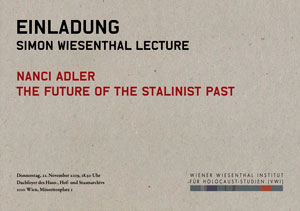Simon Wiesenthal Lectures
The Simon Wiesenthal lecture series takes place regularly every six to eight weeks and aims to present the latest research findings on the Holocaust to both a professional and a broader audience. They take into account the impressive spectrum of this discipline, the numerous questions and issues from empirical-analytical historiography to topics of cultural studies and involve young scholars as well as established academics.
Since 2007, when the Vienna Wiesenthal Institute for Holocaust Studies (VWI) was still being established, the lecture series – at that time in cooperation with the Documentation Centre of Austrian Resistance (DÖW) and the Institute of Contemporary History at the University of Vienna– has developed into the flagship of the VWI's outreach activities as a supporting element in the communication of recent academic findings in the field of Holocaust research and Holocaust and genocide studies.
For over a decade, the Austrian State Archives generously offered shelter to the Simon Wiesenthal Lectures in the roof foyer of the Haus-, Hof- und Staatsarchiv. During the challenging years of the pandemic, the lectures were held online. From autumn 2022, in order to reach out to further audiences, a new cooperation partner was found in the Wien Museum. Until the reopening of the main location at Karlsplatz, the SWL will take place at MUSA, Felderstraße 6-8, next to the Vienna City Hall.
| Simon Wiesenthal Lecture | |||
| Nanci Adler: The Future of the Stalinist Past | |||
Thursday, 21. November 2019, 18:30 - 20:00 Dachfoyer des Haus-, Hof- und Staatsarchivs, 1010 Wien, Minoritenplatz 1
|
|||
What are the prospects for reconciliation when the state denies, ignores, or co-opts a history of repression? Thirty years after the end of a dictatorship that claimed millions of victims, aside from symbolic reparations, the post-Soviet government(s) have implemented little of the institutionalised transitional justice mechanisms to reckon with this past. There has been a persistent, politically-driven effort to manage national and public memory by repressing, controlling, or even co-opting the memory of repression. Now, as under Khrushchev and Gorbachev, the government sanctions the immortalisation of victims, but draws a thick line when it comes to the discussion of the perpetrators. Not one henchman has been tried, nor one truth commission instigated, victim compensation is limited, as is archival access, the record in history textbooks is a political narrative, and researchers of Stalinism are once again harassed on spurious charges. It was not until 2015 that the state sanctioned the plan for an offcial monument to the victims of Stalinism. Most of them did not live to see it erected. This lecture will focus on some of the causes and consequences of post-Soviet Russia’s ambivalent attitude toward its Stalinist past, and reflect on how to move beyond current impasses. Nanci Adler is Professor of Memory, History, and Transitional Justice at the University of Amsterdam and Programme Director at the Institute for War, Holocaust, and Genocide Studies (NIOD). She has authored and/or edited, among others, Keeping Faith with the Party. Communist Believers Return from the Gulag (2012), The Gulag Survivor. Beyond the Soviet System (2002), Victims of Soviet Terror. The Story of the Memorial Movement (1993), and Understanding the Age of Transitional Justice. Crimes, Courts, Commissions, and Chronicling (2018). Her research focuses on transitional justice and the legacy of communism. Mit der Teilnahme an dieser Veranstaltung stimmen Sie der Veröffentlichung von Fotos, Video- und Audioaufzeichnungen, die im Rahmen der Veranstaltungen entstehen, zu. |
|||








